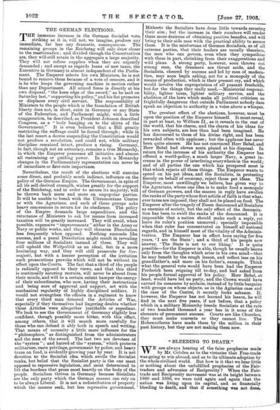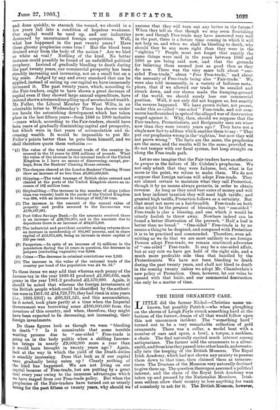" BLEEDING TO DEATH."
WE are always hearing of the false prophecies made by Mr. Cobden as to the victories that Free-trade was going to win abroad, and as to its ultimate adoption by the whole civilised world. But how is it that we hear little or nothing about the unfulfilled prophecies of the Fair- traders and advocates of Reciprocity ? When the Fair- trade and Reciprocity movement was at its height between 1880 and 1886, we were told again and again that the nation was living upon its capital, and, so financially bleeding to death, and that if something was not done,. and done quickly, to staunch the wound, we should in a few years fall into a condition of hopeless weakness. Our capital would be used up, and our industries destroyed by unrestrained foreign competition. Well, what has happened in the past twenty years ? Have these gloomy prophecies come true ? Has the blood been drained away from the body of the nation ? Are we bled as white as veal ? Nothing of the kind. No better instance could possibly be found of an unfulfilled political prophecy. Instead of gradually bleeding to death during the past twenty. years, our commercial prosperity has been steadily increasing and increasing, not on a small but on a big scale. Judged by any and every standard that can be applied, instead of eating up our capital we have immensely increased it. The past twenty years, which, according to the Fair-traders, ought to have shown a great decrease of capital even if they showed large annual expenditure, have instead shown atremendous piling up of accumulated wealth. Mr. Fuller, the Liberal Member for West Wilts, in an admirable letter to Wednesday's Times has shown under ten heads the astonishing development which has taken place in the last fifteen years—from 1886 to 1900 inclusive —years which, according to the Fair-traders, should have been years of gradually diminishing capital and prosperity, but which were in fact years of accumulation and in- creasing wealth. It would be impossible to put Mr. Fuller's points better than he puts them himself, and we shall therefore quote them verbatim :— "(1) The value of the total external trade of the country in- creased in the 15 years by 2581 millions of pounds. What the value of the increase in the internal trade of the United Kingdom is I have no means of discovering, except, per- haps, from the Bankers' Clearing House returns.
(2) The cheques cleared at the London Bankers' Clearing House show an increase of no less than 28,960,000,000.
(3) Shipping.--The total tonnage of British ships entered and cleared at the ports of the United Kingdom shows an in- crease of 161 million tons.
(4) Shipbuilding.—The increase in the number of. ships (other than war vessels) built in the yards of the United Kingdom was 694, with an increase in tonnage of 602,749 tons.
(5) The increase in the amount of the annual value of property and profits assessed to the Income-tax was 2158,167,981.
(6) Post Office Savings Bank.—In the amounts received there is an increase of 226,795,970, and in the amounts due to depositors there is an increase of 284,675,308.
(7) The industrial and provident societies making returns show an increase in membership of 934,867 persons, and in share capital of £13,972,438, being an increase in share capital of 250 per cent.
(8) Pauperism.—In spite of an increase of 54 millions in the population during the 15 years in question, the decrease in paupers (excluding vagrants) was 9,844.
(9) Crime.—The decrease in criminal convictions was 2,533.
(10) The increase in the value of the external trade of the country per head of the population was £4 8s. 2d."
To these items we may add that whereas each penny of the Income-tax in the year 1880-81 produced £1,866,636, each penny in the year 1901-2 produced £2,570,000. Again, it should be noted that whereas the foreign investments of the British people which could be identified by the authori- ties were in 1891-92 £54,728,770, they had risen in nine years (i.e., 1893-1901) to £60,331,525, and this accumulation, be it noted, took place partly at a time when the Imperial Government was borrowing some £100,000,000 from the investors of this country, and when, therefore, they might have been expected to be decreasing, not increasing, their foreign investments.
Do these figures look as though we were " bleeding to death " ? Is it conceivable that some terrible wasting process due to " one-sided " Free-trade is going on in the body politic when a shilling Income- tax brings in nearly £9,000,000 more a year than it would have brought in twenty years ago ? Again, look at the way in which the yield of the Death-duties is steadily increasing. Does that look as if our capital were gradually being eaten up ? Clearly nothing, of the kind has happened. We are not living on our Capital because of Free-trade, but are putting by a great deal every year owing to the immense advantages which we have reaped from our Free-trade policy. But when the prophecies of the Fair-traders have turned out so utterly wrung for the past fifteen or twenty years, why should we assume that they will turn out any better in the future ? When they tell us that though we may seem flourishing now, and though Free-trade may have answered very well in the past, there is a future time coming in which it will not help us, and when we shall be bleeding to death, why should they be any more right than they were in the " eighties " ? People must not forget that exactly the same things were said in the years between 1880 and 1886 as are being said now, and that the grounds for believing them seemed just as good then as they do now. There was the very same talk about " one- sided Free-trade," about " Free Free-trade," and about the necessity of Free-trade being also " Fair-trade." We were also told incessantly, in a variety of bellicose meta- phors, that if we allowed our trade to be assailed and struck down, and our shores made the dumping-ground of the world, we should surely lose our commercial position. Well, it not only did not happen so, but exactly the reverse happened. We have grown richer, not poorer, under this so-called " one-sided " Free-trade, and our com- merce has flourished in spite of the alleged war of destruction waged against it. Why, then, should we suppose that the Fair-traders, Protectionists, and Reciprocity men are wiser now than they were twenty years ago ? They have not a single new fact to adduce which enables them to say : " That put our prophecies wrong in the' eighties,' but now they will not prove wrong." The facts are the same, the prophecies are the same, and the results will be the same, provided we do not tamper with our fiscal system, but keep straight on along the Free-trade path.
Let no one imagine that the Fair-traders have an effective to quoque in the failure of Mr. Cobden's prophecies. We not only admit that they were failures, but, what is far more to the point, we refuse to make them. We do not suppose that foreign nations will adopt Free-trade. They are almost certain to maintain what they call Protection, though it by no means always protects, in order to obtain revenue. As long as they need vast sums of money and will not bear indirect taxation they will need high tariffs ; and granted high tariffs, Protection follows as a certainty. But that must not move us a hairbreadth. Free-trade on both sides might be the greatest of blessings, but " one-sided " Free-trade is also a blessing, and one which it would be utterly foolish to throw away. Nowhere indeed can. be found a better illustration of the proverb, " Half a loaf is better than no bread." " One-sided " Free-trade is by no means a thing to be despised, and compared with Protection it is to be practised and commended. Therefore, even ad- mitting as we do that we are most unlikely to see foreign Powers adopt Free-trade, we remain convinced advocates of " one-sided " Free-trade. It may be a one-sided affair, but at any rate we have got hold of the right side, and a much more profitable side than that handled by the Protectionists. We have not been bleeding to death during the past twenty years, and shall not bleed to death in the coming twenty unless we adopt Mr. Chamberlain's new policy of Protection. Once, however, let our veins be opened with that knife, and our commercial destruction can only be a matter of time.























































 Previous page
Previous page